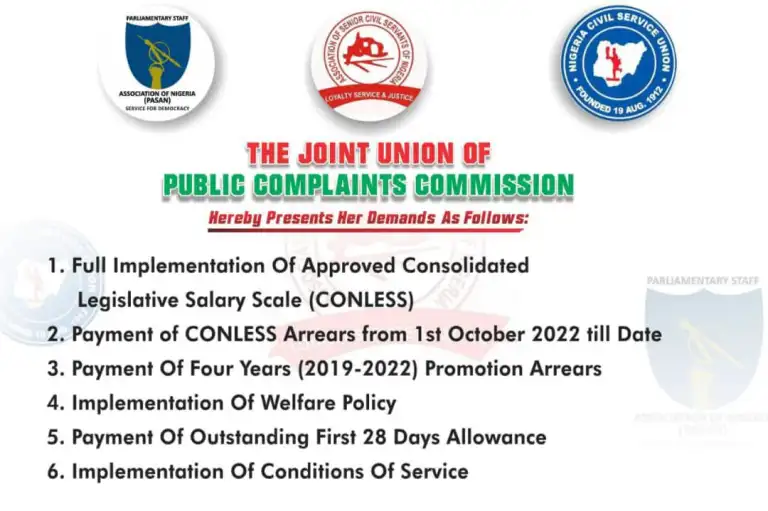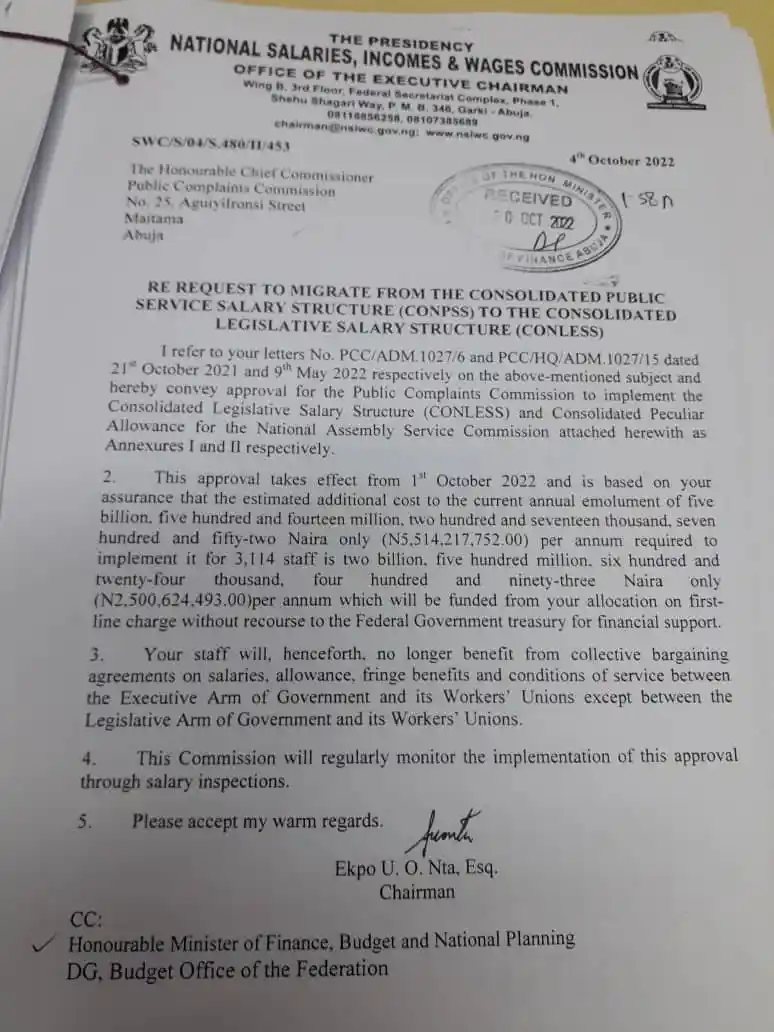News
Public Complaints Commission (PCC) Staff Break Silence on Unpaid Arrears After Years of Bullying

In 1974, a man named Jerome Udoji and a group of decision-makers suggested that Nigeria should create its own ombudsman. This was to help control corruption in the government sector.
During this period, Nigeria was experiencing an increase in oil revenue, leading to substantial investments in public services and administration. However, the government-owned organizations were not performing as well as expected. The outcomes were not matching the significant financial and resource inputs. As a result, there was a growing need for better supervision to prevent misuse of power and resources during that era.
In 1975, the Public Complaints Commission (PCC) — the supposed ear for the people — was established. The Public Complaints Act gave it oversight powers over all government agencies and corporate bodies, save the legislature and the military. The commission would however join other MDAs in the sluggish scuffle of public service. Since its formation, the ombudsman has suffered a well-documented history of underfunding and obscurity, so much that it affects their operations.
As a result, the commission is not only ill-equipped, the staff members are also underpaid.
NewsNGR has gathered that the prevailing economic realities have made the effects of the PCC’s underfunding more pronounced.
What then happens when oversight is underfunded? NewsNGR interviewed some staff members at the PCC to document their working conditions, wage payments and complaints management.
‘NOBODY IN THAT OFFICE IS HAPPY’

When Chiamaka Olalere* joined the PCC in 2014, she did so out of her conviction to fight corruption in Nigeria. To her, joining the PCC would place at the forefront of fighting administrative injustice in the country.
In 2023, nine years later, Olalere wished she had taken a different route. For her, working in the commission was a bitter irony of injustice and repression.
“What’s the point of fighting administrative injustice when our own working conditions are unfair?” Olalere began with a rhetorical question.
In the interview with NewsNGR, Olalere narrated how working was difficult because she had not been getting her remunerations.
“We have been protesting our minimum wage for years in the commission. A Level 8 staff at the PCC would naturally get N60,000 per month. I could have let go if they paid other remunerations. We do investigations on the go, we get a lot of cases, how much can you manage? I have been employed in the commission for nine years now and I have not got my Kilometer Allowance since. Some have spent 12 years or more and it’s the same thing,” she told NewsNGR on Wednesday.
Olalere continued by explaining how staff had to take pay cuts in 2016.
“There was even a time they were paying us salaries in percentages. It’s not like the federal government does not make this money available, those at the top just do whatever they like with it. It was in 2016. During that time, we even collected as low as 31 percent of our salary. At some other points, we were lucky to get 60 percent,” she explained.
Oloyede Janet*, another staff of the PCC, told NewsNGR that she had not received her promotion arrears for 4 years.
“We have years on unpaid arrears. Personally, I have not collected my promotion arrears for four years now. We’ve been meeting; we heard they did not include the money in the budget. We also heard promises. I just want to be able to afford a life with my pay,” Oloyede told NewsNGR.
‘I WAS KIDNAPPED AND THE PCC DID NOT DROP A KOBO’
In a more harrowing narration, Kasali Olujide*, another staff member at the PCC, described a case of kidnap, debt and denial that involved the PCC and a bank in Nigeria.
“In November 2015, about a year after I joined the service, I was abducted while returning from work. I had my wife and a four-month-old child in the car with me as I drove home. Six men with heavy guns and machetes robbed everyone on the street, left them alone and took me away,” Olujide said.
“I was with them from Monday to Sunday! With the help of my church and sibling, I was released on ransom. After I was released, I had to borrow a loan to cover the debt of the kidnap ransom. PCC Nigeria did not help me, despite the fact that I was returning from work when I was kidnapped.
“You know what made it worse? PCC introduced a pay cut. They started paying in ridiculous percentages. I could no longer meet the payment obligations for the loan I borrowed. In a nutshell, I have been paying one debt or the other till now. I have the responsibility of my home staring into my eyes daily. To make it worse, the commission has not paid my arrears for years now.”
In his interview with NewsNGR, Olujide also told NewsNGR that the PCC was underfunded. He explained that allocation to the commission was not enough to cater to the demands of real-time investigations. According to him, even the PCC management couldn’t do anything about it. Olujide thinks the federal government allocates too little to the commission in the first place.
“The management may have little to nothing they can do to make any positive change. After all, they are also civil servants. The federal government does not allocate nearly enough in the first place. But even at that, it should be better. The problem solely lies with the commissioners,” he told NewsNGR.
‘YOU COULD BE WITH THE COMMISSION, I DON’T WANT TO LOSE MY JOB’
When NewsNGR first contacted Olujide, he blatantly refused to say anything about the commission. He expressed a vivid disinterest in granting an interview with an unknown person. The reason for his skepticism? Anyone could be a mole from Abuja.
Olalere, who was NewsNGR first contact within the PCC, had warned NewsNGR about this. According to her, the PCC management could be vindictive and staff had been threatened with losing their jobs should they protest or cry out.
“Most people would not want to talk to you. Every day, staff members face threats in the form of disciplinary panels or losing their jobs if they are caught talking about the commission,” she said.
True to her speculations, NewsNGR called and texted six staff members of the PCC between August 16 and August 22. Five out of the six refused to say anything about the commission. One Yemi (not real name), a staff of the PCC in Delta State, explained to NewsNGR that he was not willing to yield information for fear of losing his employment.
“For all I know, you could be with the civil service. You could even be a senior staff of the commission. Look, I am a civil servant, and I am not willing to lose my job,” he retorted on a call with NewsNGR.
CONLESS FOR CONPSS; THE FEDERAL GOVERNMENT HAS NOT BEEN PAYING ATTENTION

The demand for funding at the PCC is an age-long struggle, from what NewsNGR gathered.
On November 23, 2021, the Nigerian Senate — taking cognisance of the underfunding — announced the implementation of the Consolidated Legislative Salary Structure (CONLESS) for the PCC. NewsNGR gathered that the PCC had operated a Consolidated Parliamentary Salary Structure (CONPASS) before then. NewsNGR findings also revealed that the CONPASS was outdated and unable to cater to the payment of PCC staff.
According to the Senate, the CONLESS covers funding and the remunerations necessary for PCC staff to function optimally. At the Senate sitting that implemented CONLESS, the Senate stated that funding was necessary to intensify the oversight function of the ombudsman.
Speaking at the sitting, Senator Akinyelure, who was the chairman of the Senate committee on ethics, privileges and public petitions, described the implementation as a step to extending the anti-corruption campaign of President Buhari to the people.
“While newly recruited university graduates in Public Complaints Commission (PCC) collect about N60,000 as monthly salary on Grade Level 8 Step 2, their counterparts in the EFCC collect far higher than that. As a way of remedying the demoralising situation, the Senate leadership has approved the upgrade of the PCC salary scale from CONPASS to CONLESS with attendant better packages,” he had said.
However, 21 months later in July 2023, the PCC staff members shut down their offices nationwide in an industrial action over the implementation of the CONLESS.
Speaking on CONLESS, Olujide told NewsNGR that the PCC payslip started reading CONLESS in 2021 but it did not reflect in the pay.
“The struggle for CONLESS started in 2018 and sometime in 2021/22 our payslips started reading CONLESS. Apparently, we were migrated to CONLESS but on a very low percentage of about 20. In October 2022, the National Wages, Incomes and Salaries Commission gave full approval for this new salary structure and gave the commission the balance of what was needed to complement the existing budget to see that staff enjoyed the full package of CONLESS. Yet, from October 2022 till July 2023, we were not paid neither were we given the arrears. We have been going from one meeting to another,” Olujide told NewsNGR.

Olalere had a more pungent disposition to the CONLESS issue. She believed that implementation is delayed due to the corruption of PCC commissioners.
“Minimum wage took us protesting and locking the office before they paid. We had to appeal to the National Assembly to approve the CONLESS salary structure for us as CONPASS is too poor. God answered us and the Salary and Wages Commission approved it, to take effect in October 2022. However, we’re yet to be paid that money because the commissioners have used it to buy 36 Prados and they shared among themselves. Despite the hardship, all they have done is tell us there’s no money,” Olalere lamented.
PCC UNWILLING TO ADDRESS THE ISSUES
On Monday, People’s Daily reported that the staff of the PCC, under the Joint Unions of Public Complaints Commission (JUPCC), were getting ready for a demonstration over the CONLESS and unpaid remunerations.
However, all of NewsNGR efforts to get the commission’s management to provide updates on the CONLESS and address the allegations proved abortive.
On August 23, NewsNGR contacted Olumide Abodunrin, PCC Director of Public Relations, Foreign support and Interagency Publications. He, however, refused to address the issue.
Abodunrin insisted that NewsNGR write to the chief commissioner about any inquiry. Speaking to NewsNGR, Abodunrin said that he could not give NewsNGR any information without the permission of the chief commissioner. When NewsNGR asked for the standard response time frame, Abodunrin did not give a definite answer.
“You know how things go in the civil service. Anything that you want to know, you write to the chief commissioner. So, I can’t answer you. Also, we’ve been holding several meetings; we even had one yesterday. So, I really cannot tell you anything,” he told NewsNGR.
Staff members at the PCC told NewsNGR that they were still hopeful. They envisage a reality where the CONLESS will be implemented fully and the commissioners investigated.
EDITOR’S NOTE: The names of the PCC staff in the story have been changed to protect their identities and prevent unwarranted sanctions by civil service leadership.


 Business8 months ago
Business8 months agoFinance minister: Tinubu’s government met a bad economy, can’t borrow to fix it

 News5 months ago
News5 months agoWorld Bank disburses $300m palliative loans

 Business8 months ago
Business8 months agoWorld Leaders, Including Obasanjo, Call for End to Dollar Dominance

 News6 months ago
News6 months agoBlogger Wins N1m Prize at WIMBIZ Conference

 Business9 months ago
Business9 months agoNigeria’s Crude Oil Production Falls to 3-Month Low Amid Persistent Oil Theft

 Business1 month ago
Business1 month agoFinance Analyst, Aja: Naira Strengthens as Forex Subsidy Boost BDC Operators

 News5 months ago
News5 months agoNigeria Achieves 78% Vaccination Coverage in 12 States, Reveals Official

 Business7 months ago
Business7 months agoIt’s false, NNPCL not involved in secret recruitment